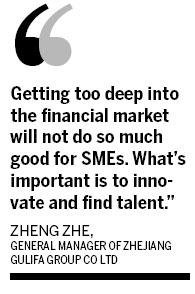China Development Bank Securities Co Ltd (CDBS) said that it is negotiating with regulators to launch asset-backed bonds that would ease the credit crunch for small and medium-sized enterprises (SMEs).
The bonds will be based on a pool of assets injected by SMEs, with investors to be repaid by cash flows generated from the asset pool, Li Weibin, president of CDBS, a securities unit of China Development Bank, said on Wednesday.
"I talked with the Shenzhen Stock Exchange just a few days ago, and I plan to meet with other regulators," said Li. "Hopefully, the securities will be issued next year."
China Development Bank was one of the first domestic financial institutions to sell asset-backed securities. In 2005, the bank launched mortgage-backed and credit asset-backed securities.
In 2008, China Zheshang Bank Co Ltd, a regional private commercial bank, issued asset-backed securities based on SME loans. The securities, valued at 696 million yuan ($110 million), were the first of their kind to focus on SMEs.
Small companies have been struggling with tough credit conditions resulting from the central bank's move to battle inflation and property bubbles via tight monetary policy.
Left with less capital to lend, banks have shied away from lending to SMEs and charged them higher interest rates.

SMEs, for their part, have few fixed assets and poor credit records, so they lack bargaining power with banks.
Issuing asset-backed securities, a direct financing method, will open new funding avenues for SMEs, said Li.
It is hard for SMEs to issue securities on their own, due to limited assets, he said. But by pooling their assets, SMEs will have sufficient collateral to obtain direct financing.
Li said that government involvement will be essential in limiting asset-backed securities' risks. 1Li suggested that the government undertake due diligence and help select SMEs that have similar financial status and credit records to participate in the bond issues.
A government-backed special fund should also be set up to guarantee the SME asset-backed bonds. Financial derivatives, such as credit default swaps, could also be used to boost the bonds' credit ratings, according to Li.
Compared with bank loans, SMEs are less likely to default on bonds, as issuing bonds requires issuers to publish annual reports and stipulate clear obligations.Those conditions bring them under closer investor and regulatory scrutiny, Li said.
Pan Jianzhong, chairman of Wenzhou Juyi Group, a shoe manufacturer, said that the idea of an SME asset-backed securities issue was very interesting.
"Bank loans are too expansive for us as an SME. Anything that can reduce our financing cost, we will try," he said.
Zheng Zhe, general manager of Zhejiang Gulifa Group Co Ltd, a hardware and cutting-tools maker, was more cautious.
"We are more willing to cut costs," he said. "Getting too deep into the financial market will not do so much good for SMEs. What's important is to innovate and find talent."





